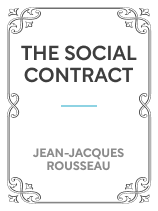

This article is an excerpt from the Shortform book guide to "The Social Contract" by Jean-Jacques Rousseau. Shortform has the world's best summaries and analyses of books you should be reading.
Like this article? Sign up for a free trial here .
What’s Jean-Jacques Rousseau’s social contract theory? How is it different from the social contract theories of other philosophers?
Jean-Jacques Rousseau’s theory of the social contract is similar to theories used by other enlightenment scholars such as Thomas Hobbes (Leviathan) and John Locke (Two Treatises of Government). However, there are a few major differences that determine each philosopher’s conclusion as to what makes a state legitimate.
Keep reading to learn about Rousseau’s social contract theory and how it’s different.
Jean-Jacques Rousseau’s Social Contract Theory
To meet the standards necessary for a legitimate society, Rousseau explains that all members of this society must come together as equals and agree to a social contract. This social contract has one rule: Every member must choose to exchange their personal freedom (freedom to pursue what’s good for themself as an individual) for civil freedom (participation in a society that pursues what’s good for everyone).
The Sovereign
Under the social contract, all members of the society form a collective political entity: the sovereign will of the people (sovereign for short). The sovereign isn’t an existing political body like a court or parliament. Instead, the sovereign is closer to the overarching ideology or purpose of society—the reason for its existence and every use of its political authority.
The sovereign is a kind of “public person” that can act with absolute freedom. Therefore, by agreeing to the social contract, members of the society are no less free than they were before—they just exercise their freedom as a member of the sovereign, rather than as an individual. However, while the sovereign is absolutely free, it can exist only so long as it pursues a good common to all of its members. Any pursuit of what is good only for some members means the people no longer have a collective will and therefore aren’t acting as the sovereign.
Once the people enter into the sovereign, their society becomes a state and they become citizens—terms emblematic of their new political entity.
The Legitimacy of the Social Contract
A state built on the social contract meets both of Rousseau’s standards for legitimacy:
1) Protection: The social contract protects all citizens of a state. An attack on any individual who’s part of the sovereign is an attack on the sovereign as a whole. Therefore, everyone has a vested interest in protecting each other because doing so also means protecting themselves.
2) Freedom: Under the social contract, nobody is any less free than they were before—they merely exercise their freedom through the sovereign, rather than as individuals.
The Creation of a Legitimate State
Therefore, Rousseau concludes that a social contract (and the sovereign it creates) is the foundation of a legitimate state and that the ultimate goal of this state is the common good for all its citizens. Since the social contract is the foundation of a legitimate state, Rousseau argues that the use of force to preserve it (or the common good) is therefore a legitimate use of political authority. That is, the state can and should punish those who pursue self-interest at the expense of the common good.
How Rousseau’s Social Contract Theory Is Unique
Here’s our analysis of the differences among the social contract theories of Rousseau, Hobbes, and Locke.
Hobbes
Hobbes’s social contract is an agreement to give up all personal freedoms in exchange for protection. In practical terms, this means obedience to a government run by a single leader with absolute power—so long as the leader provides protection, their state is legitimate and they have the right to do anything.
Rousseau versus Hobbes
Rousseau argues explicitly against Hobbes’s claim that a person can give up all of their freedoms to their government, saying no ethical person would do such a thing and that a government has no obligation to protect subjects who have no rights. In addition, Jean-Jacques Rousseau’s social contract theory asserts that the sovereign will of the people must run a state, rather than the will of one individual leader.
Locke
To Locke, the social contract is an agreement to give up the personal freedom to commit violence against others (except in self-defense) or to punish them for wrongs—they give those rights instead to a government. This government must run according to the will of the majority, and its main purpose is to protect the people’s right to life, liberty, and property. So long as the government runs by majority rule and protects these rights, its state is legitimate.
Rousseau versus Locke
The main difference between Rousseau and Locke is over what constitutes the will of the people. Rousseau believes that a legitimate state must pursue a good common to all of its citizens, rather than a majority of citizens—a division between a minority and a majority means the people can’t agree on a collective will. In addition, Rousseau’s social contract theory asserts that a legitimate state doesn’t need to explicitly deprive its citizens of the freedom to harm or punish others—citizens who are members of the sovereign and pursue a common good won’t harm each other, since harming another citizen means pursuing a good not common to all.

———End of Preview———
Like what you just read? Read the rest of the world's best book summary and analysis of Jean-Jacques Rousseau's "The Social Contract" at Shortform .
Here's what you'll find in our full The Social Contract summary :
- An explanation of Jean-Jacques Rousseau's social contract theory
- What a legitimate and ethical government looks like
- The two standards a society must meet to be legitimate






